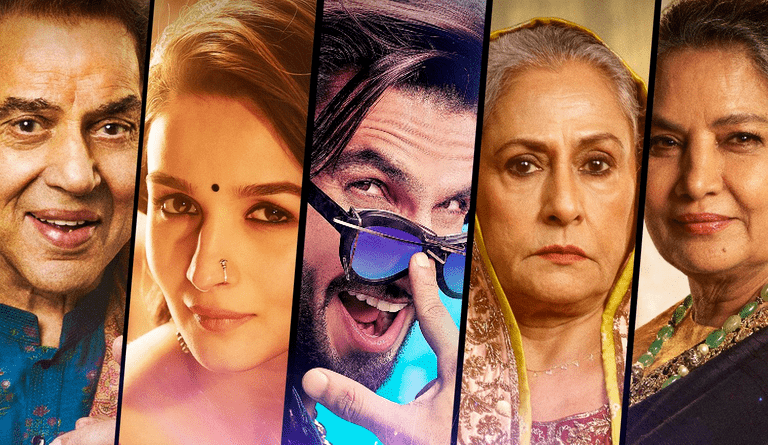

Karan Johar’s much-anticipated release, Rocky Aur Rani Kii Prem Kahaani, marks a glorious celebration of his 25 years in Bollywood. As a devoted fan of the good old charm of Bollywood, I couldn’t resist watching it on the very first weekend. The film’s title, initially hints at a classic love story, but it goes beyond the conventional tropes. It gracefully manages to balance humor and thought-provoking messages. It seems like a movie where Karan Johar came to rectify all his past mistakes with just one film. It felt like Kabhi Khushi Kabhie Gham minus all the problematic segments all over again.
Also Read – Dev D: “Audaciously Masculine!” – Editorial
The first half of Rocky Aur Rani Kii Prem Kahaani is a breezy mix of romance, laughter, and old Hindi songs. However, as the movie progresses into the second half, the fun moves out, and the preachiness comes in. It fearlessly addresses the suffocating effects of patriarchy on our closest relationships, shedding light on its impact on individuals and families alike. It dauntlessly confronts the sensitive issue of fat shaming within the confines of our homes. It is not just a love story but a compelling journey of growth, reflection, and societal awareness.
Rocky Aur Rani Kii Prem Kahaani is a movie depicting two completely different personalities in love, swapping their families as a compatibility exercise. Imagine the chaos when sweetshop scion, the rich conservative Punjabi brat Rocky, enters the house of a liberal Bengali fiery TV journalist, Rani, because it was precisely that. After indulging in the captivating world of Rocky and Rani once again (because the second time’s the charm), I couldn’t wait to share my thoughts. However, it’s worth noting that there are even more reasons why this movie can leave a lasting impression on anyone.
You couldn’t possibly start without mentioning the songs. Karan Johar artfully intertwined the magic of old Bollywood songs, weaving a tapestry of nostalgia that transcends time and touches the deepest chords of our hearts. The masterful use of these songs in pivotal moments created a symphony of emotions that resonated with us. In the true sense, these sheer melodies had the power to hold the audience captive and also helped us feel every emotion. After all, the only right way to ask someone to come on a drive with you is by playing “आजा मेरी गाड़ी मे बैठ जा.”
The writers fearlessly confront and dismantle harmful stereotypes that have plagued society for years. With utmost sensitivity and courage, they challenge deeply ingrained misogyny through the portrayal of strong, empowered female characters. Rocky Aur Rani Kii Prem Kahaani confronts patriarchy head-on, dismantling age-old prejudices that have confined women’s potential and autonomy.
It also delves into the profound distinction between fear of parents and genuine respect for them. In fact, in Alia Bhatt’s family, we can clearly see that her mother and Alia are managing the expenses of the house. Furthermore, in the second half, the movie celebrates Ranveer Singh’s mother’s character as she finally goes for that audition, defying the suffocating chains of patriarchy.
Rocky Aur Rani Kii Prem Kahaani weaves a tapestry of nostalgia and enhancement through numerous well-crafted callbacks to previous films. If you didn’t scream on “कह दिया ना बस कह दिया,” I’m sorry, but you might not be a true Bollywood fan. You can’t tell me that the multiple repetitions of “আমি যামিনী” weren’t intentional. Even while they were setting fire to the pyre, I know your mind screamed Kabhi Khushi Kabhie Gham, because SAME. These callbacks serve as a beautiful tribute to the cinematic legacy that has captured the hearts of audiences across generations.
The narrative exudes a powerful female perspective, and Rani emerges as a force of empowerment and autonomy, unlike other Bollywood movies. From the very beginning, the film embraces the essence of women’s agency, portraying Rani as a woman in control of her destiny, unafraid to make bold decisions that shape her life. By placing Rani at the center of the narrative and giving her the reins of her destiny, the movie defies old-age gender norms and advocates for women’s empowerment.
The attention to detail beautifully portrayed the theme of the movie. One particular thing that stands out for me is when Poonam (Rocky’s mother) feels free from societal norms and expectations. As she embraces her individuality, the absence of a दुपट्टा on her head symbolizes her liberation and defiance of traditional constraints, whether it’s the सात बाजे वाला audition scenes or the end scene where they went to Rani’s house for wedding discussions.
The film’s wedding sequence also offers a striking contrast between the conventional and the progressive. During the कन्यादान ceremony, Rocky’s father breaks the norm and proudly places his son’s hand in Rani’s hand. This scene, along with the वर्णमाला scene where Rocky bows down in front of Rani, celebrates equality and mutual respect between the couple. The attention to detail not only enhances the storytelling but also deepens the audience’s emotional connection with the characters and their journey.
Eternal Code (2019), written and directed by Harley Wallen, is a sci-fi thriller that delves… Read More
Regarding Us is a drama-comedy that traces the delicate intersections of identity, faith, and found… Read More
A world where no one can go outside and everyone lives alone in tiny rooms… Read More
The Devil’s Left Hand brings together elements of horror, mystery, and thriller under the direction… Read More
Fear Street: Prom Queen marks the fourth entry in the popular Fear Street film series,… Read More
Hold Me, Softly is an indie romantic drama from Ina Tiernan Bailey, shot in Phoenix… Read More
We use cookies, just to track visits to our website, we store no personal details.